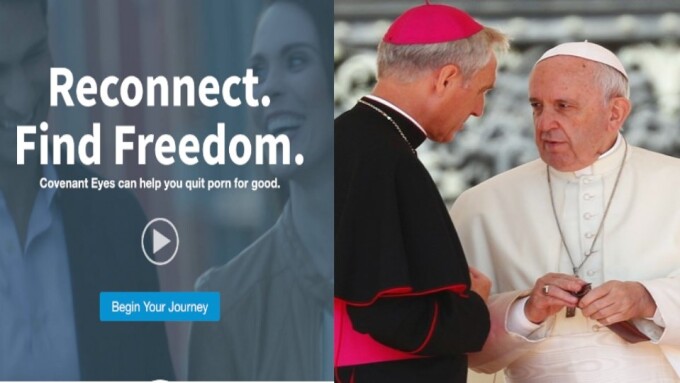WASHINGTON, D.C. — A noticeable ramping up of anti-porn rhetoric among religious groups involved in the War on Porn is coinciding with the lengthy 2020 presidential campaign in the U.S.
Today, a prestigious Capitol Hill publication, Congressional Quarterly, published on its Roll Call vertical an article entitled “Christians turn to artificial intelligence to stop porn use,” highlighting a private company called Covenant Eyes that targets evangelical men.
This comes days after Pope Francis I, spiritual head of the Catholic Church and the theocratic ruler of the Vatican, spoke at a tech forum condemning “digital pornography” in the harshest terms.
Although War on Porn groups and lobbies often try to conceal their religious motivations (e.g., traditionalist Catholic in the case of the National Center on Sexual Exploitation, NCOSE; Mormon in the case of Fight the New Drug), the usual “sex panic” propaganda that flares up during every electoral cycle is now endorsed by religious leaders and groups.
A survey published last week by the Pew Research Center shows that 76 percent of U.S. citizens do not think religious organizations should publicly endorse political candidates. However, the survey also found that 70 percent of Republicans and 56 percent of Democrats “attend religious services in which they agree substantially with the political positions of the clergy.”
The Purity-Industrial Complex
Today's Roll Call, a vertical of Congressional Quarterly which is widely read by Beltway insiders, showcased Michigan startup Covenant Eyes in a piece by tech reporter Gopal Ratnam.
“Evangelical groups are turning to artificial intelligence and machine-learning technologies to help their members fight addiction to online pornography in a budding industry that one scholar calls an emerging ‘purity-industrial complex’,” writes Ratnam.
Tech companies “closely affiliated with church groups,” the reporter continues, “are capitalizing on the fears of devout Christians that ‘porn is the greatest threat to Christian purity and even the moral standard of the nation.’” The last quote comes from Samuel Perry, a University of Oklahoma sociologist and author of “Addicted to Lust,” a study of porn consumption among evangelicals.
Perry has popularized the name “purity-industrial complex” to refer to people profiting from panics around sexuality, which they stoke through lobbies and direct action.
Unfortunately Ratnam’s article quotes questionable statistics by the religiously motivated NCOSE, a propaganda outfit founded by traditionalist Catholics in the 1960s and which rebranded several times, including a long stint as Morality in Media.
The well-funded NCOSE lobbies politicians and large corporations like Google to convince them of a supposed “public health crisis” around porn, which in their expansive definition includes publications like Sports Illustrated and Cosmopolitan.
Covenant Eyes is based in Owosso, Michigan, and, according to Roll Call, they design and sell “software filters designed to detect computer or device users accessing pornography.”
“The company works with pastors and ministries to address pornography use among their members.”
“You know that people in your ministry are watching porn, and you know that porn use hinders spiritual growth and healthy relationships,” the Covenant Eyes website states.
“After buying a subscription to Covenant Eyes and installing the software on their devices,” the article continues, “users are asked to provide an email and phone numbers for a list of friends, family or pastors, called accountability partners. If a user then accesses pornography on their laptop or smartphone, the software then would capture a screenshot, blur it and send an email to the 'user’s ally or allies,' who they have selected to help them in their journey,’ says Dan Armstrong, a spokesman for the company.”
“The ally or allies then get what’s called a 'concerning screenshot' and indicate that they should review the activity, according to the company’s website."
Unfortunately, these and other dubious "Pray the Porn Away" schemes are taken seriously by many in the mainstream press, even after similarly inspired "Pray the Gay Away" for-profit scams have been widely discredited.

A General Loss of the Sense of Human Dignity
Last Thursday, Pope Francis I spoke to the participants of a meeting on “Child Dignity in the Digital World.”
After an introduction in which the theocratic ruler of Vatican City, where the event was held, referred to children’s access to online adult content and also admitted his Church’s role in mishandling serious accusation of sexual abuse by Catholic clergy, Pope Francis said this about online porn in general:
“The dramatic growth of pornography in the digital world is, in itself, most serious, the fruit of a general loss of the sense of human dignity; frequently it is linked to human trafficking. What makes this phenomenon even more disturbing is the fact that this material is widely accessible even to minors via the internet, especially through mobile devices. The majority of scientific studies have highlighted the profound impact of pornography on the thinking and behavior of children. It will surely have lifelong effects on them, in the form of grave addiction, violent behavior and deeply troubled emotional and sexual relationships.”
Francis I's statement about this "general loss of the sense of human dignity" come only a day after it was reported that a bishop picked by this Pope to investigate sexual abuse of children is facing accusations himself.
Earlier this year, after much delay, Francis I presided over the first summit on sexual abuse in the Catholic Church.
The conflation of all sexual expression with “human trafficking” is one of the standard myths spread by War on Porn crusaders. It is unclear which “majority of scientific studies” Pope Francis referenced, but the next statement about “grave addiction” is also an unfounded, pseudoscientific myth that is part of War on Porn propaganda.
Though the intent of the speech and the conference was to discuss how to shield minors from adult content, Pope Francis’ statements about porn in general endorse a discredited viewpoint.
Expect the Pope's religiously motivated notions, hiding under the cloak of pseudoscience, to be echoed by legislators, candidates and clergy around the world, especially during the 2020 electoral year as they continue to spread sex panic among voters.
For the full Roll Call article about Covenant Eyes, “Christians turn to artificial intelligence to stop porn use,” click here.
For the official transcript of Pope Francis I’s speech to participants of the meeting “Child Dignity in the Digital World,” click here.
For XBIZ’s ongoing coverage on the War on Porn, click here.







